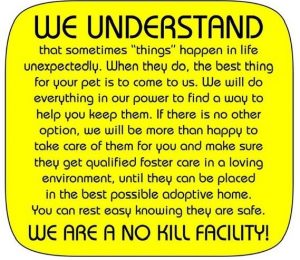
DUE TO SPACE LIMITATIONS WE DO NOT & CAN NOT ACCEPT DRIVE-IN DROP-OFF SURRENDERS
All surrenders are done by appointment on a space-available basis (and our availability changes day-to-day). Our shelter is a managed admission organization and we reserve the right to accept or refuse any pet presented for surrender. Our shelter does not place any time limits on a pets stay. The number of pets accepted for surrender is specifically determined by animals that are adopted, freeing up space for new arrivals. Be advised that we are a limited admission, no-kill shelter. This means that we have limited space / resources to accept pets. Though we DO NOT have an age limit we DO NOT accept animals that are aggressive, have a bite history (provoked or not), have severe medical conditions or are on medication/s or special diets.
IF we are FULL and unable to accept your pet on a specific day – we highly recommend calling early in the morning each day to see if we have space. (we generally start answering the phones at 10 a.m.)
Please NOTE: if you are contacting our shelter to take a stray (or even your own pet) and the animal has ANY wounds of unknown origin- including but not limited to bites, scratches, abscesses, scars – the MA Rabies laws state the animal must be quarantined for 6 MONTHS or euthanized. Sadly this is a STATE LAW and is due to concerns for rabies and a pet with a wound being exposed to a potentially rabid animal. Our shelter will not and can not take animals with such wounds.
You may call our shelter for surrender fees and availability at 978 422 8585, our shelter generally accepts surrendered animals Tuesday – Thursday from 11 a.m. – 5:30 p.m when we have a vet on staff to evaluate and exam incoming animals.
You should also consider getting help if your pet has a behavior issue through the Virtual Pet Behaviorist
PRIOR to calling us to surrender a pet/s, we ask you to please follow the steps below:
- First call your veterinarian and ask them to fax us BOTH
– any/all handwritten medical records/history AND
– any/all vaccine history
Basically a copy of your pet/s entire medical records even if they are expired) faxed to 978 422 8574 – it is critical that we have any/all handwritten records AS WELL as the vaccination history so we can review the pets overall health and what the pet may need when it comes to our shelter. Even if your pet has expired medical records and/or vaccinations we STILL need to see all previous history. We also recommend you bring any copies you may have in your possession as well. - Once you’ve confirmed your vet has faxed all necessary medical history call our shelter at 978 422 8585 – we will quote you a surrender fee. Our surrender fees vary and depend greatly on your animals medical history, vaccination status, spay/neuter status, breed, age, reason for surrender.Surrender fees are also based on what we estimate this pet will need medically prior to adoption (i.e. does your pet/s need any blood work, dental work, spay/neuter, vaccinations, tests, etc).
- Please have your pet groomed/bathed and looking and smelling good your pet will have a better chance at being adopted if he/she looks clean and happy and wearing a new collar. If your pet has special toys or items a crate, heart worm and/or flea and tick medications, beds etc please bring them with a label with your pets name on them so we can pass them on to the new adopting family. Bringing comfort items will help your pet adjust more quickly in his/her new home. MAKE SURE ANY of the pet’s personal ITEMS ARE CLEANED AND WASHED (beds/carriers/toys) as we will send those items home with the new adopting family. PLEASE DO NOT BRING LITTER BOXES
- To save time when you arrive at the shelter, fill out the PET PROFILE (below) for EACH pet you are bringing in. This profile is very important (please be honest) because it helps our staff determine the best family to place your pet with.
- DOG Personality Profile form 2 sided– double sided
- Cat Profile
*DID YOU KNOW? The average cost to SHELTER ONE pet nationally without providing ANY medical care is $225, Every day 32,000 dogs and cats are placed in animal shelters that’s over 11 million animals a year. Add birds, small animals, reptiles and other pets and the annual number grows by millions. Over 25% of the dogs in shelters are pure bred; the rest are equally, if not more lovable, mixed breeds affectionately referred to as mutts.
Helpful Tips
- NEVER EVER advertise “Free to good home”
- Spay/neuter the animal to avoid attracting backyard breeders or puppy mill operators
- Charge at least $25 to discourage resale of pets to labs and others
- Ask each prospective owner for his/her veterinarian’s name as a reference and check it.
- Ask for identification in the form of a photo I.D. Write down the information, or scan/photocopy it if possible
- Ask for a phone number and explain that you’d like to check on how the animal’s doing. An honest person will gladly share the information with you.
- Have the person sign an “adoption” contract concerning your pet stating that they will not go to research. Having this in writing gives you legal recourse.
- Ask to visit the place where your pet will live before your release the pet to the new owner.
Never assume because someone brings their wife or children that they are honest and will give your pet a good home. There are documented cases in which “brokers” brought their children with them when collecting animals so that they would look “legitimate”.
If time is of the essence and you must leave your pet, please take it to a reputable public or private shelter rather than give it away free to someone you don’t know anything about.
Unlike selling a used care or appliance, finding a home for your beloved pet is an emotional as well as practical experience. If you act with your heart and avoid acting in haste, you’ll be headed in the right direction.
Sample Pet Resumes
Pets in Rental Housing: Myths & Realities
A Guideline for Property Owners
Sample Forms of Agreement Between Tenant & Landlord
National apartment locators:
- apartmentsearch.com
- apartments.com
- equityapartments.com
- forrent.com
- hubbuzz.com
- interimhousingsolutions.com
- move.com
- peoplewithpets.com
- rent.com
- https://www.mycheapapartments.com/
- ApartmentList.com – the world’s first apartment-matching engine. You can modify your search for just pet friendly housing by choosing the Pet Policy option from the Amenities tab at the bottom of the page
Could You Give Away the Family Pet?
- Why are you considering giving up your pet? Whats the problem? We can help with answers and helpful tips here
- Note to deploying Military Members: Please see Moving and Travel for possible alternatives, including foster care.
Parents who give up a child’s pet/s should realize that they are not only hurting the pet/s, they are directly hurting their children and giving them the message that family doesn’t matter.
 When Your Dog (or other pet) Bites – please read this if you are contacting us to surrender a pet that has a bite history, has already bitten or become aggressive or has bitten or is aggressive towards other animals.
When Your Dog (or other pet) Bites – please read this if you are contacting us to surrender a pet that has a bite history, has already bitten or become aggressive or has bitten or is aggressive towards other animals.
Definition of Aggression – aggression is defined as dangerous behavior directed at another individual, including other animals. This behavior includes barking, biting, lunging, snarling, hissing, swatting, etc. The cause can range from territorial defensiveness and protectiveness to fear or social anxiety.
Please know if you re-home an aggressive dog or cat and it bites another person or pet, you can still be sued even though you are no longer the owner, because you knowingly passed on and re-homed an aggressive pet. Every time a pet is re-homed, their stress level goes up, increasing his/her potential aggressive-ness and unpredictability.
If YOU are surrendering a pet because of a behavioral problem, health concern, or increasing age, it should be noted that this is merely passing the problem on. Problem pets are not typically adoptable and failure to disclose a problem is unfair, both to the shelter, and the pet itself. If you are giving up your pet because YOU do not trust him/her due to aggression towards people or animals it is UNFAIR to surrender that pet to a shelter/rescue or another home. Not to mention, you can and will be subject to a potential lawsuit because you knowingly gave your aggressive/unpredictable pet to another person or family (or shelter/rescue) with the knowledge the pet was unsafe, untrustworthy or has/had aggressive tendencies toward people or other pets. Please consider if YOU were looking to adopt a pet – YOU WOULD NOT wish to adopt and bring home a pet that had aggressive unpredictable behaviors, where that pet could potentially seriously injure your family or resident pet/s.
Another option to consider: If you have two pets, and must give up one pet, you should keep the pet with the problem and work with it, let the more adoptable pet be placed in the shelter.
If you must surrender a problem pet PLEASE be upfront and honest with the shelter or rescue. WE do not wish to have the liability YOU knew the pet had when surrendering it. WE will also figure out if you surrendered a pet with a behavior or aggression issue… probably sooner than you’d imagine and generally within the hour/s after you leave. OUR SHELTER WILL NOT adopt out any pet/s with any form of aggression for any reason EVER and it’s unfair to expect us to do so. Dogs that are 6+ months are also temperament tested when surrendered to the shelter – we test for a variety of aggression…from food, to possessions, to strangers, and so on.
How to Live with your Pets even if you have Allergies– About 15% of the population is allergic to dogs and / or cats. However, there are many ways to still live with a pet even though a family member is allergic.
- Make sure you are allergic to pet dander and not something else in the house. Your pet may not even be the cause of your allergies. Visit your doctor to find out if your allergies can be controlled through medication and/or diet. Consult your doctor to find out exactly what you are allergic to.
- Create an area, most likely the bedroom of the person who is allergic, where your pet simply isn’t allowed. Close the door to this room at all times to ensure this area doesn’t have any of the allergens from your pet.
- If medications do not help you entirely, then try these following solutions. Use Allerpet/D, (for dogs) or Allerpet C (for cats) we sell this at our shelter and it is available in many pet stores and by mail order. Apply to pets fur using washcloth once a week. It neutralizes the dander. Use HEPA air cleaners throughout the house to rid the air of allergens. These are available at most home and garden stores such as Home Depot.
- Bathe your pet on a regular basis. This will significantly reduce the amount of allergens your pet carries around.
Surrendering your pet because the landlord says no? Read about YOUR legal rights!
Pitbulls – This link is meant for those seeking resources for Pit Bulls in Massachusetts. Pit Bulls are the most common type of dog surrendered to adoption centers and found as strays. They also represent a majority of the dogs euthanized each year at shelters and animal control facilities.
Exhaust Other Solutions First!
Are you having problems with your pet? Litter box? Food aggression? Territorial behavior? Spraying/Marking the house? Having a tough time integrating your pet into the house? Don’t give up! Email your questions at staff@sterlingshelter.org, problems or issues to this email address which goes directly to the Staff here at the shelter!
We will do some research, find a solution and email you back with suggestions on how to correct the problem(s). (Most questions can be answered within 24 hours unless staff is out on a rescue, sick or otherwise unable to check email.) This service is a reference tool and the information and suggestions are coming from a variety of sources, trainers, behaviorists and professional animal organizations dedicated to helping you and your pet.
Rover or Fluffy needs a new home Don’t call the shelter:
Here are a few tips to try before making that fateful trip.
- If your pet just doesn’t fit your family or lifestyle, try to cope. Find a training club or school, read a training book, change your expectations, and try to build a bond with the animal that will keep it in your home. Call us – we can certainly recommend trainers or behaviorists that might help you work with your pet/s to make them a better member of your family.
- If you bought your pet from a breeder, call them. Responsible REPUTABLE breeders will ALWAYS take back a dog they produced or will have a list of people looking for an adult dog from their breeding program.
- If your dog is purebred, contact a breed rescue. Google your breed of dog/rescue in your state most all breeds have at least ONE breed rescue that might help or direct you. Contact the American Kennel Club www.akc.org or the AKC Gazette (212) 696-8390 for the list of rescue contacts it publishes each year. Rescues don’t always have room for another dog, but they may have suggestions for solving problems or may know about someone who is looking for a dog like yours. You can also try www.petfinder.com for a list of the breed rescues in your area.
- If life circumstances change and force you to find a new home for your pet, use the local pet network to help www.petfinder.com is one of the best. Put posters up at the veterinarians office and the pet supply store; ask the groomer and boarding kennel staff to keep their ears open for a potential new home; and RESPONSIBLY advertise in the newspaper. Call your local shelters and ask if they have a referral list for potential adopters who are looking for particular pets.
- NEVER advertise Free to a good home even if you don’t intend to charge an adoption fee. Some people will take a free dog but may not take good care of it. Instead, advertise a cost that will meet veterinary expenses incurred while getting Fido ready for a new home. If you find a potential adopter who just can’t afford the price, you can always decrease it, but you can’t charge someone if you advertise the dog as free.
- Make sure your pet is up-to-date on vaccinations, is spayed or neutered, and is free of parasites before placement in a new home. If the new owner will use a different veterinarian, make sure to include a copy of the pets health records in an adoption packet. Our on-site clinic offers low cost spay/neuter services for dogs/cats/rabbits/mice/rats and guinea pigs
Good Reason or Bad Reason?
There are circumstances when a dog must leave its life-long home: when an owner becomes physically unable to care for a dog or the owner is terminally ill; when a dog has shown unprovoked aggression. These are GOOD reasons. Although the aggression factor may indicate the dog is un-adoptable.
“BAD” reasons are: the dog won’t listen; we can’t house break the dog; the dog chews; we’re moving and can’t have a dog anymore; no one takes care of the dog but me; the dog is alone too much; the dog growled/snapped at my child/me. Behavior Solutions
Please consider that if you have a vicious, fear biting, territorial, aggressive animal that’s not good with children, we will not be able to place this pet, as it is a liability. If you are planning to surrender your animal due to aggression problems remember YOU are ultimately liable if that pet bites or hurts anyone. Please do not expect ANY shelter or rescue organization to place a pet that is aggressive or has serious behavioral issues. Be honest with whomever you are trying to get to place your pet. Massachusetts has a VICIOUS DOG LAW stating that if YOUR dog has bitten and broke skin and YOU knowingly adopt, give away, place, surrender or transfer ownership of that dog YOU are ultimately LIABLE for any damage that dog does to another person. This means you may be sued!!!
You must also understand you will pay a surrender fee to bring your animal to our shelter. Many people seem to be under the misconception that things related to an animal shelter are free. The cost to maintain an animal shelter is incredible. The shelter must pay for food, vet bills, rent, insurance, medication, heat, electric, phone, website, advertising, staff, and hundreds of other things that all businesses have to pay for. The charge to surrender an animal is trivial compared to the well being of your pet. Please consider spending the money it would cost you to surrender your pet, into obedience and training and then you might not have to give up your pet!
If your pet is showing aggressive behavior
- you should IMMEDIATELY have a full physical exam performed by your veterinarian. Illnesses/diseases/infections/epilepsy/allergies can all cause unexplained or escalating strange behavior and/or aggressive behaviors.
- Next contact a trainer or behaviorist. Our shelter highly recommends you work with a certified trainer – we refer people and their pets with behavioral issues to Patty Bolack @ Good Dogs School of Obedience or consult with an ANIMAL BEHAVIORIST. Which is generally a veterinarian that is trained and certified to help your pet with more severe behavior issues the Boston Animal Rescue League’s Center for Shelter Dogs that is staffed by a small team of behaviorists.
PLEASE remember, if you are giving up YOUR pet because of these behavior problems no one else is going to want to deal with them either. You made a commitment for better or worse, please honor that commitment. There really is NO such thing as a bad pet just an owner that needs the proper tools to help your pet be a good family member. A dog or cat takes their cues from their owners. If you let your pet climb on the couch, scratch up your furniture, chew up shoes and bark incessantly this is NOT the fault of your pet. Animals need training and guidance much like young children. Most behavior issues can easily be solved with a dedicated plan and follow through.
My Insurance Company is Making ME Give up My DOG! Have you heard this before? Many insurance companies DO or WILL cancel a homeowners policy for owning what they consider an “aggressive breed”. BUT NO ONE HAS TO GIVE UP THEIR DOG! There is a solution in Massachusetts its called The Fair Plan. The FAIR Plan will cover all breeds of dogs. In Massachusetts, if homeowners are denied coverage, insurance can be obtained through the states FAIR (Fair Access to Insurance Requirements) Plan, operated by the Massachusetts Insurance Property Underwriting Association. The FAIR Plan can be reached at Two Center Plaza, Boston, MA 02108-1904, (617) 723-3800 or (800) 392-6108, and at https://www.mpiua.com or contact the MSPCA Advocacy Department at (617) 522-7400.
- Pit-Friendly Home Owners Insurance Policies – click here
- Pit Bull Resource Site – click here






